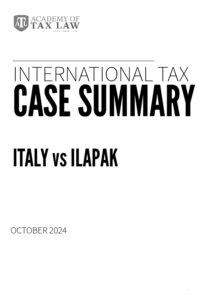Italy vs Ilapark: CASE SUMMARY
Home » Case Library »
Italy vs Ilapark: CASE SUMMARY
Case Information
- Court: Supreme Court of Cassation, Italy
- Case No: 26432/2024
- Applicant: ILAPARK ITALIA SPA
- Defendant: Agenzia delle Entrate (Italian Revenue Agency)
- Judgment Date: 10 October 2024
- Download the FULL JUDGMENT
Judgment Summary
The Italy v. Ilapark SPA case brings forward critical issues in transfer pricing, specifically the appropriateness of the selected transfer pricing method for a business entity under Italy’s tax framework and its alignment with OECD guidelines. Ilapark Italia SPA, an Italian subsidiary within the Ilapak Group, was involved in a dispute with the Italian Revenue Agency over tax assessments concerning intercompany pricing. The core issue was whether the chosen TP method accurately reflected the “normality” of prices in a manner compliant with Italian tax standards.
Ilapark Italia argued that the Comparable Uncontrolled Price (CUP) method was the most accurate reflection of its arm’s length transactions, following the OECD’s preferred hierarchy, which typically prioritizes CUP over other methods. The Revenue Agency, however, determined that the Transactional Net Margin Method (TNMM) was more appropriate, given the company’s controlled and centralized operations, particularly since Ilapark’s activities largely involved manufacturing within Italy for distribution to low-risk subsidiaries across multiple countries. The Agency contended that Ilapark’s pricing framework did not align with open-market comparability, making TNMM a better option to determine profit margins rather than isolated transaction prices.
Four primary grounds of appeal were presented by Ilapark. First, it argued an apparent lack of thorough examination on the part of the lower courts regarding the CUP method’s applicability. Second, it claimed that Italian law should recognize the OECD’s preference for the CUP method, which it argued to be the most relevant method based on Ilapark’s transactions. Third, Ilapark contested the precedence of EU law over domestic Italian tax regulations, seeking alignment with European tax standards on TP method preference. Finally, the company argued that penalties should be recalculated to reflect recent legislative updates, which might reduce the taxpayer’s liability.
The Supreme Court of Cassation dismissed Ilapark’s first three appeals, maintaining that the Revenue Agency’s selection of TNMM was appropriate under Italian tax standards. It emphasized that OECD guidelines are advisory rather than binding and that national standards could reasonably select the most applicable TP method based on the specifics of the business structure. Additionally, the Court highlighted that CUP was inappropriate for Ilapark’s centralized production model, where market comparability was inherently limited. The decision reinforced Italy’s position that OECD guidelines, while influential, do not impose a strict hierarchy on TP method selection.
However, the Court upheld the fourth appeal concerning penalties, agreeing with Ilapark that recent legislative changes justified a reassessment. The ruling mandates that the case return to the Court of Second Instance in Tuscany to reevaluate the penalties based on these updates, potentially resulting in a recalibrated, lesser penalty. This judgment underscores Italy’s approach to OECD flexibility in TP cases, prioritizing local regulatory frameworks and business specifics.

